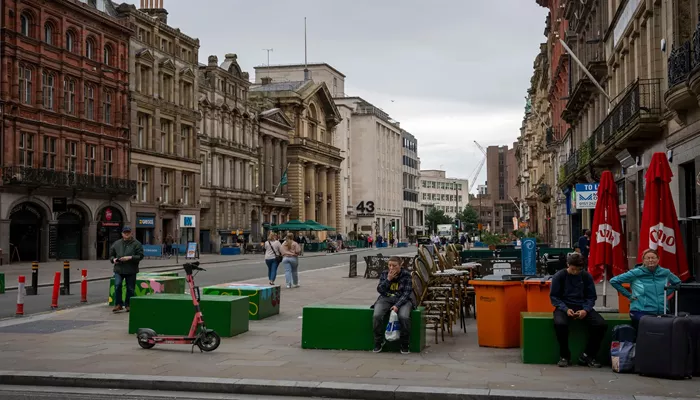Britain’s Recent Riots Pose Significant Challenge for Prime Minister Keir Starmer.
The recent riots across Britain, marked by torched cars and attacks on mosques and hotels housing asylum seekers, have presented a serious challenge to Prime Minister Keir Starmer. Although the violence has subsided, the unrest highlights the immense task ahead for his government.
Analysts suggest that defusing tensions, particularly those inflamed by far-right groups over immigration and strained public services, is crucial. These issues are particularly acute in economically struggling areas of Britain. Opinion polls show public support for Starmer’s crackdown on violent protesters. However, many of those who view the rioters as criminals also demand a reduction in immigration, according to Steven Fielding, an emeritus professor of political history at the University of Nottingham. Starmer has promised to cut migration numbers and now faces pressure to deliver on that promise, especially in regions where economic decline has fueled unrest.
Immigration concerns have resurfaced in Britain, particularly in areas with high unemployment and overburdened public services. Last year, around 30,000 people arrived in the country via small boats, a fraction of the nearly 750,000 people who legally entered the country minus those who left. The controversy over the previous government’s plan to send asylum seekers to Rwanda, a plan that was ultimately scrapped by Starmer, has further fueled anti-immigrant sentiment.
Sunder Katwala, director of the research institute British Future, emphasized the need for Starmer to address the root causes of discontent in neglected areas by improving employment opportunities and public services. “He needs to deliver for those towns and cities where people’s primary concerns are NHS waiting lists and job opportunities,” Katwala said.
Starmer’s background as a chief prosecutor during the 2011 London riots has informed his approach to handling the recent disorder. He is drawing on his experience to ensure that those responsible are swiftly prosecuted and jailed to deter further violence. However, preventing future riots will be more challenging. Claire Ainsley, a former policy director for Starmer, noted that the far right has persisted in both good and bad economic times, but their influence is diminished when economic conditions improve. She added that improving living standards and making people feel part of a functioning system is essential to reducing the appeal of extremist ideologies.
Ainsley also pointed to the role of social media in spreading misinformation and cautioned against linking all rioters to immigration issues. While extremists may be involved, some participants may simply be opportunistic looters.
The recent riots, including the attack on a hotel housing asylum seekers in Rotherham, underscore the severity of the disorder. The controversial Rwanda plan, launched by former Prime Minister Boris Johnson and adopted by his successor Rishi Sunak, was intended to address small-boat arrivals but ultimately failed to achieve its goals. Sunak’s pledge to “stop the boats” drew significant attention to immigration issues but did little to solve the problem.
The scale of small-boat arrivals is relatively modest by global standards, but the perceived lack of control over immigration has fueled public concern. Starmer’s options for curbing these crossings are limited, and while he plans to crack down on people-smuggling gangs, a broader migration deal with France is likely necessary to make a significant impact.
The government’s plan to expedite the processing of asylum requests aims to reduce the number of refugees housed in hotels at public expense, a key grievance for anti-immigrant protesters. The concentration of asylum seekers in less affluent areas, where hotel costs are lower, has made them targets for recent riots.
Legal immigration has also become a point of contention, with successive Conservative governments failing to reduce annual net immigration to below 100,000, a key issue during the 2016 Brexit referendum. Despite this, legal immigration has tripled since Brexit, driven in part by programs for people from Ukraine, Hong Kong, and Afghanistan. While there is broad public support for these programs, concerns about the overall scale of immigration persist.
Before losing the general election, Sunak tightened migration rules, restricting the right of some legal immigrants to bring relatives to Britain. These changes are expected to reduce immigration numbers in the coming year. However, further reductions could harm key sectors such as healthcare and hinder Starmer’s efforts to revive the economy.
The recent unrest underscores the importance of economic growth, revitalizing neglected cities, and investing in public services. “The riots aren’t telling this government anything it didn’t already know,” Professor Fielding said. “They are just making its task more urgent.”


